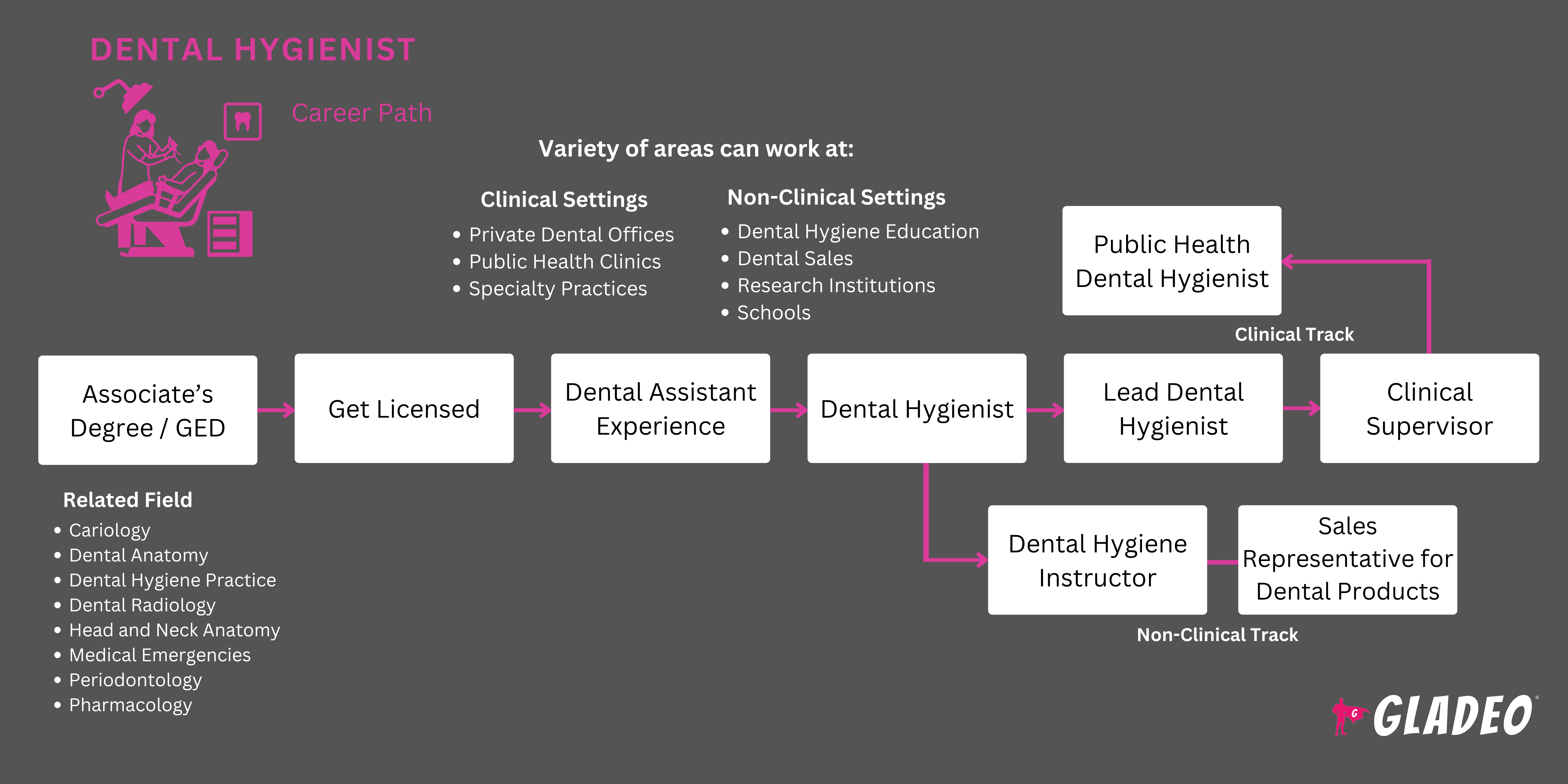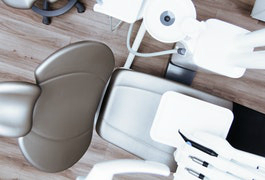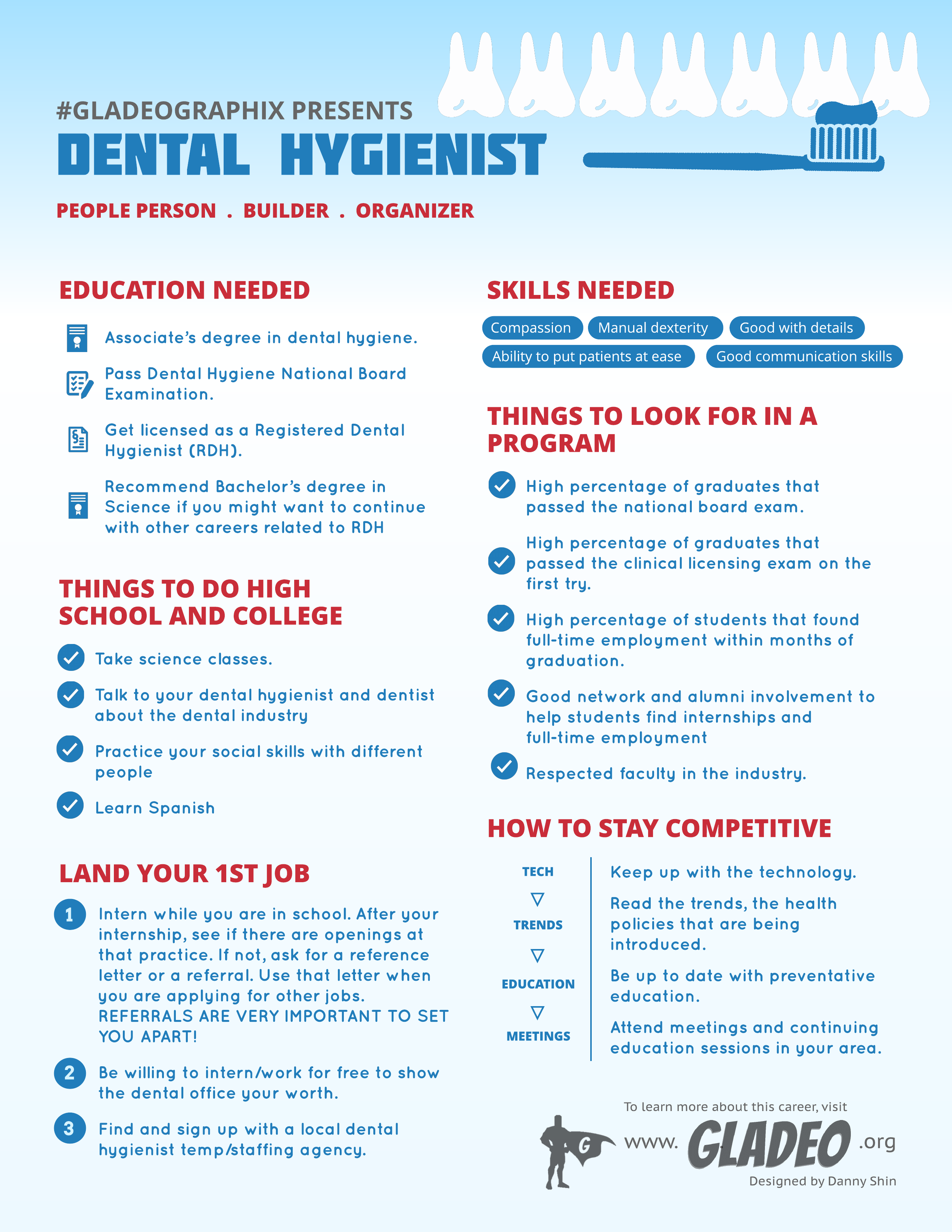Прожекторы
Dental Hygienist, Hygienist, Licensed Dental Hygienist, Pediatric Dental Hygienist, Registered Dental Hygienist (RDH)
Ideally, our teeth should last us a lifetime! But unlike the rest of our bodily internal structures, our teeth are directly exposed to the outside environment. This puts them at risk of exposure to bacteria, temperature changes, and physical wear and tear. Combined with other factors, these can contribute to cavities, root canal problems, enamel loss, and gum disease. That’s why we’ve got to take good care of our oral hygiene – and Dental Hygienists can help with that!
Dental Hygienists are the first line of defense in detecting oral health issues and providing preventive dental care. They clean teeth, apply protective sealants and fluoride treatments, take dental x-rays, look for problems, and educate patients on how to maintain good oral health. By focusing on prevention and early detection, they help us avoid problems in the future so our teeth can stay healthy for as long as possible!
- Helping patients achieve and maintain good oral health
- Identifying dental problems so they can be resolved as soon as possible
- Working in a clean, professional environment
- Good income potential and strong job outlook
"One of the most rewarding aspects of being a dental hygienist is the focus on preventing disease. While dentistry plays an essential role in fixing dental problems, such as placing fillings or crowns to restore damaged teeth, dental hygiene centers on preventing those issues from happening in the first place. Helping patients avoid extensive dental treatments is incredibly fulfilling. Maintaining health through prevention is the essence of dental hygiene.
Another rewarding part of being a dental hygienist is patient education and personalized care. Spending one-on-one time with patients to answer their questions, guide them in understanding their oral health, and tailor home care techniques and product recommendations to their specific needs creates strong, trusting relationships. Each patient’s lifestyle and habits are unique, so it’s essential to provide personalized solutions that fit their situation. Seeing a patient light up with understanding, knowing they have the tools and knowledge to care for their oral health effectively, is immensely satisfying.
These interactions make dental hygiene not just a clinical job but a compassionate role that impacts lives by preventing disease and enhancing well-being. Empowering patients to care for themselves and knowing that you’re helping them stay healthy is what makes this career so fulfilling." - Whitney DiFoggio, MA/RDH at Teeth Talk Girl
График работы
Dental Hygienists can work either full-time or part-time in dental offices.
Типичные обязанности
- Take and develop dental x-rays (e.g., bitewing, panoramic) to identify issues.
- Analyze X-rays for problems like impacted teeth, bone loss, and wisdom teeth.
- Assess and document patient oral health. Report findings to the dentist.
- Take patients’ blood pressure and pulse. Explain upcoming procedures to patients to help them understand what to expect.
- Perform periodontal scaling and root planing to treat gum disease.
- Clean and polish teeth, removing tartar, plaque, and stains.
Use hand, power, and ultrasonic tools for thorough cleaning and stain removal. - Apply polishing pastes for smooth, bright teeth.
- Apply fluoride treatments for enamel protection, especially for children.
- Place sealants on cavity-prone teeth, especially for young patients.
- Prepare and sterilize dental instruments and equipment. Set up treatment areas with necessary instruments and supplies.
- Assist dentists during procedures by passing instruments, suctioning, and maintaining patient comfort.
- Discuss treatment plans, including follow-up appointments and recommended dental work.
- Educate patients on oral hygiene techniques, like proper brushing and flossing.
- Advise on diet and oral care products (e.g., toothbrushes, floss).
- Educate on aftercare for scaling and root planing.
Дополнительные обязанности
- Manage inventory of dental supplies.
- Monitor and maintain equipment functionality.
- Take impressions of patients’ teeth for the creation of models and dental appliances.
- Create digital charts for patients.
- Support sedation or anesthesia administration by monitoring patient comfort and readiness.
- Assist with dental emergencies.
- Recognize signs of distress and act swiftly to provide appropriate first aid.
- Help front office staff with appointment scheduling, as needed.
- Document patient care and treatment plans for continuity.
- Maintain clean work uniforms (scrubs).
- Review patient charts for the day.
Мягкие навыки
- Внимание к деталям
- Общение
- Customer service
- Эмпатия
- Focus
- Organizational skills
- Терпение
- Решение проблем
- Работа в команде
Технические навыки
Dental Hygienists need hard skills related to the following:
- Dental equipment maintenance
- Dental hygiene procedures and protocols
- Dental impressions
- Dental software such as Dentrix
- Dental tools and instruments such as scalers, polishers, and x-ray equipment
- Dental x-ray machines
- Ловкость
- Infection control standards and health regulations
- Medical record-keeping
- Patient confidentiality and compliance
- Scheduling
- Sterilization procedures
“This field requires persistence and care. People matter while they are in your chair as much as the procedure you are rendering; therefore, a clinician must be willing to read the personality of the patient, what keeps them comfortable, and body language. The dental field is all about personal care and compassion that comes from wanting to work with people of all kinds and to care for your patient, each one. Communication will take a RDH far and most successful in this career path, proper ability to explain what is being taken place and using solid examples to have patient relate in other aspects is also key. To maintain a fulfilling career choice and composure in this field one should really work in a dental office early on to see the scope of the field first on, its limitation, and its weight on the body. Most don’t know that the hygienist is most likely the first to treat the NEW patient in the office, so much relies on how that first visit of treatment and personal care goes to have the patient return.” - Marjan Shafieyan, RDH
- Private dental practices
- Public health clinics
- Больницы
- Nursing homes
- Школы
Dental Hygienists play a vital role in delivering quality care while building positive relationships with patients. The job requires a strong focus on patient comfort and safety, along with the stamina for long hours of standing and bending. With multiple patients to see daily, good time management is essential, as is the ability to stay calm under pressure.
Following strict health and safety standards is a must, so Dental Hygienists should be well-versed in policies and health codes. Staying updated on new technologies and procedures is also important and helps them provide the best care possible.
The dental hygiene field is evolving with a focus on preventive care. Dental Hygienists play a key role in this shift, educating patients on oral health practices and promoting long-term wellness. Increasingly, hygienists are also involved in broader healthcare efforts, identifying signs of systemic conditions such as diabetes and cardiovascular disease that can manifest in the mouth.
Technological advancements are transforming the field, too! Digital tools like intraoral scanners and electronic health records are enhancing diagnostics and treatment planning, while specialized treatments like laser therapy for gum disease are becoming more common. Additionally, teledentistry enables hygienists to consult with patients remotely, expanding access to care.
Finally, sustainable practices are gaining importance, with many dental offices adopting eco-friendly products and waste-reduction strategies to support environmental health.
"The dental hygiene industry is always advancing with new technology and approaches to patient care. Lasers are becoming more common, and tailored home care plans now include innovative products and technology to better support individual needs. Hygienists are also trained to screen for systemic conditions, reinforcing the connection between oral health and overall wellness. In addition, smoking cessation and patient education are key focuses, emphasizing that oral health impacts the whole body, not just the mouth." Whitney DiFoggio, MA/RDH at Teeth Talk Girl
Dental hygienists often share an early interest in science, particularly biology and health. They may have enjoyed hands-on activities, such as crafts or hobbies requiring fine motor skills.
"A typical “day in the life” of a dental hygienist is dynamic and ever-changing, largely depending on the variety of patients scheduled. No two days are ever the same, which keeps the work interesting and engaging. You might start the morning with a new patient coming in for a comprehensive exam, followed by routine cleanings, then perhaps a more involved appointment like scaling and root planing for a patient with periodontal disease. Later, you could see children for their cleanings, apply sealants to help protect their teeth, or take x-rays to monitor oral health or diagnose issues. This variety ensures that there’s never a dull moment in the day.
In a private practice, which is where I work, my day begins with setting up my room and making sure all my supplies are ready. Each appointment involves preparing for the patient, performing the cleaning or procedure, and cleaning up the room between patients. After each appointment, I take time to write progress notes and chart relevant information to ensure comprehensive records are maintained. This process repeats throughout the day, with a steady flow of patients who each bring unique needs and require different levels of care.
Working in a private practice differs significantly from working in a corporate office. Private practices may have a more personal touch, with familiar patients and a more close-knit team environment, while corporate offices might have a faster pace and standardized protocols across multiple locations. Regardless of the setting, each appointment as a dental hygienist offers an opportunity to connect with patients, educate them on proper dental care, and contribute to their overall health.
Also, oftentimes the day flies by! Between the variety of procedures, from routine cleanings to more complex treatments like scaling and root planings, there’s always something happening. The day’s pace, paired with the satisfaction of knowing you’re making a difference in people’s health and well-being, makes it a rewarding and fulfilling profession." - Whitney DiFoggio, MA/RDH at Teeth Talk Girl
- An associate degree in dental hygiene is the most common entry-level qualification. The Commission on Dental Accreditation accredits hundreds of suitable programs around the country.
- Common courses include:
- Anatomy and Physiology
- Clinical Dental Hygiene
- Dental Materials
- Dental Radiography
- Инфекционный контроль
- Nutrition and Oral Health
- Oral Pathology
- Periodontology
- Training programs include hands-on components in labs and clinical offices.
- Students can also pursue a bachelor’s to qualify for more advanced positions.
- In addition, licensure is required in all states. This involves passing the written National Board Dental Hygiene Examination (NBDHE) plus any additional state jurisprudence exams covering state-specific laws and regulations.
- The NBDHE is governed by the Joint Commission on National Dental Examination. It’s administered by the testing vendor Pearson VUE.
- The NBDHE features 350 multiple-choice questions in the following areas:
🗸 Discipline-Based Component (200 items) covering:
🗸 Scientific Basis for Dental Hygiene
🗸 Provision of Clinical Dental Hygiene Services
🗸 Community Health/Research Principles
🗸 Case Based Items (150 items)
- Depending on the state or region, other possibly required exams include:
- ADEX Dental Hygiene Examination
- CDCA-WREB-CITA
- Central Regional Dental Testing Service
- Southern Regional Testing Agency
- After passing a board exam and any regional or state clinical exams, candidates can apply for state licensure to become a Registered Dental Hygienist (RDH).
- Many states mandate continuing education courses for RDH license renewal.
- Employers may also require cardiopulmonary resuscitation (CPR) certification.
- Look for programs accredited by the Commission on Dental Accreditation (CODA) and featuring access to clinical opportunities, experienced faculty, and facilities with modern dental equipment.
- Compare tuition and fees costs, noting in-state vs. out-of-state costs.
- Review scholarship and financial aid options.
- Check out graduation and job placement statistics.
- In high school, take advanced courses in biology, chemistry, and math to prepare for college-level training programs.
- Gain experience through volunteer work or internships in dental offices, if possible.
- Develop strong communication and interpersonal skills by participating in group activities.
- Apply for part-time jobs or internships where you can interact with customers and computer systems.
- Read books and articles related to dental hygiene. Also, check out Teeth Talk Girl’s YouTube videos and career information page to learn more about the field!
- Ask to do an informal interview with a working Dental Hygienist.
- Keep track of work and academic accomplishments for your resume and/or college applications.
- Attend career fairs and industry events to grow your network and learn about career paths.
- Complete an accredited RDH program and study hard for the written and clinical exams. Some students attend programs like The Real RDH or StudentRDH to help them prepare for these rigorous exams.
"To prepare for a future in dental school or dental hygiene school, high school and college students can consider the following:
Shadowing a Dental Office: This is the most valuable experience to gain insight into the dental field. Spend a day observing a dentist, dental hygienist, and dental assistant in different offices to see the day-to-day tasks and determine what part of the field interests you most. This can also help confirm or adjust your career choice.
Connect with Guidance Counselors: High school students should talk to their guidance counselors for advice on classes to take and information on relevant programs in their area. Counselors can guide you toward courses that align with your goals in dentistry or dental hygiene.
Focus on Science Courses: Enroll in advanced science classes such as biology, anatomy, physiology, microbiology, chemistry, and even physics. These courses will build a strong foundation in the sciences, which is crucial for a career in dentistry.
Take Communication and Social Sciences: Classes in communication, speech, sociology, and psychology are valuable for developing skills to work with patients and the general public. These courses can enhance your ability to connect with and care for others, an essential part of any dental profession.
Business Courses: If you're considering owning your own practice in the future, business classes can be extremely helpful to prepare you for the management and administrative side of running a practice.
Research College Prerequisites: College students should check the admission requirements for the specific dental or dental hygiene schools they are interested in. While prerequisites are often similar across schools, some may have unique requirements, so it’s necessary to check each school admission’s website for a list of prerequisites prior to applying." - Whitney DiFoggio, MA/RDH at Teeth Talk Girl

- Before completing dental hygienist training, ask the school if they have connections with potential employers.
- Reach out to your professional network to ask for tips about job openings.
- Make a profile on LinkedIn and other networking platforms to advertise your availability.
- Scan job portals like Indeed.com, Glassdoor, ZipRecruiter, and other sites.
- Review job ads and look for keywords to list on your resume, such as:
- Общение
- CPR
- Dental cleaning
- Dentrix software
- Fluoride treatments
- Инфекционный контроль
- Межличностные навыки
- Oral hygiene
- Patient care
- Patient education
- Scheduling
- X-ray
- Check out Dental Hygienist resume templates for ideas.
- Read sample interview questions such as “How do you teach patients about oral care?” or “How do you handle patients who are anxious?”
- Practice your replies via mock interviews.
- Ask former professors and supervisors to write recommendation letters or request their consent to list them as references.
- Keep up with current developments related to the industry.
- Know the terminology before going into interviews.
- When you get called for an interview, research the employer to learn more about them.
- Dress appropriately for job interviews!
- Come in early to prepare for the day by reviewing patient notes and preparing rooms and equipment, as needed.
- Always wear clean scrubs and look presentable.
- Practice diligent sanitation procedures and ensure instruments are sterilized as appropriate.
- Read equipment manuals and become a subject matter expert on the machines you use.
- Keep supplies stocked and equipment well maintained.
- Build a solid reputation with patients. Earn their trust and accolades!
- Talk with your supervisor about additional certifications and specialized training you could complete to qualify for advancement.
- Network with other dental professionals and seek mentorship.
- Consider other positions within the office, such as office manager.
- Anticipate problems and be proactive in preventing them. When a problem is unavoidable, offer feasible solutions and stay focused on end goals.
- Grow your professional network by staying active in organizations like the American Dental Hygienists’ Association.
- Stay current on regulatory changes to ensure your organization is always compliant.
- Consider relocating or switching employers if necessary to achieve career goals.
Сайты
- ADEX Dental Hygiene Examination
- American Academy of Dental Hygiene, Inc.
- American Dental Association
- American Dental Education Association
- American Dental Hygienists’ Association
- AndyRDH’s Dental Hygiene Academy
- CDCA-WREB-CITA
- Centers for Disease Control and Prevention – Oral Health Division
- Central Regional Dental Testing Service
- Colgate Professional
- Commission on Dental Accreditation
- Crest + Oral-B Professional
- DentalCare.com
- Dental Hygiene Academy
- Dental Hygiene Programs Directory
- Dental Hygiene Seminars
- Dimensions of Dental Hygiene
- International Federation of Dental Hygienists
- Journal of Dental Hygiene
- National Board Dental Hygiene Examination
- National Center for Dental Hygiene Research & Practice
- National Dental Hygienists’ Association
- National Institute of Dental and Craniofacial Research
- RDH Magazine
- Southern Regional Testing Agency
- StudentRDH
- Teeth Talk Girl
- The Real RDH
- Today’s RDH
Книги
- Dental Hygiene: Theory and Practice, by Michele Leonardi Darby BSDH MS
- Ethics and Law in Dental Hygiene, by Kristin Minihan-Anderson RDH MSDH
- Wilkins’ Clinical Practice of the Dental Hygienist, by Linda D. Boyd, et. al.
Dental Hygienists are important front-line members of the healthcare community, but there are plenty of other professions to consider if this career isn’t resonating with you. Check out our list below for some ideas!
- Licensed Practical and Licensed Vocational Nurse
- Медицинский ассистент
- Ассистент трудовой терапии
- Ophthalmic Medical Technician
- Помощник физиотерапевта
- Radiologic Technologist
- Зарегистрированная медсестра
- Респираторный терапевт
- Ассистент хирурга
- Surgical Technologist
- Veterinary Technologist and Technician
"One last piece of advice: dental hygiene is a versatile career that truly has something for everyone, and it’s what you make of it! Whether you’re looking for full-time or part-time work, dental hygiene offers options that fit your lifestyle. Temping is also a fantastic choice, allowing you to create your own schedule and gain varied experiences in different offices. Beyond clinical work, there are rewarding non-clinical paths in education, research, business, and more. This flexibility to shape your career according to your goals and interests is one of the greatest aspects of the field." - Whitney DiFoggio, MA/RDH at Teeth Talk Girl
Лента новостей

Популярные вакансии

Онлайн-курсы и инструменты









